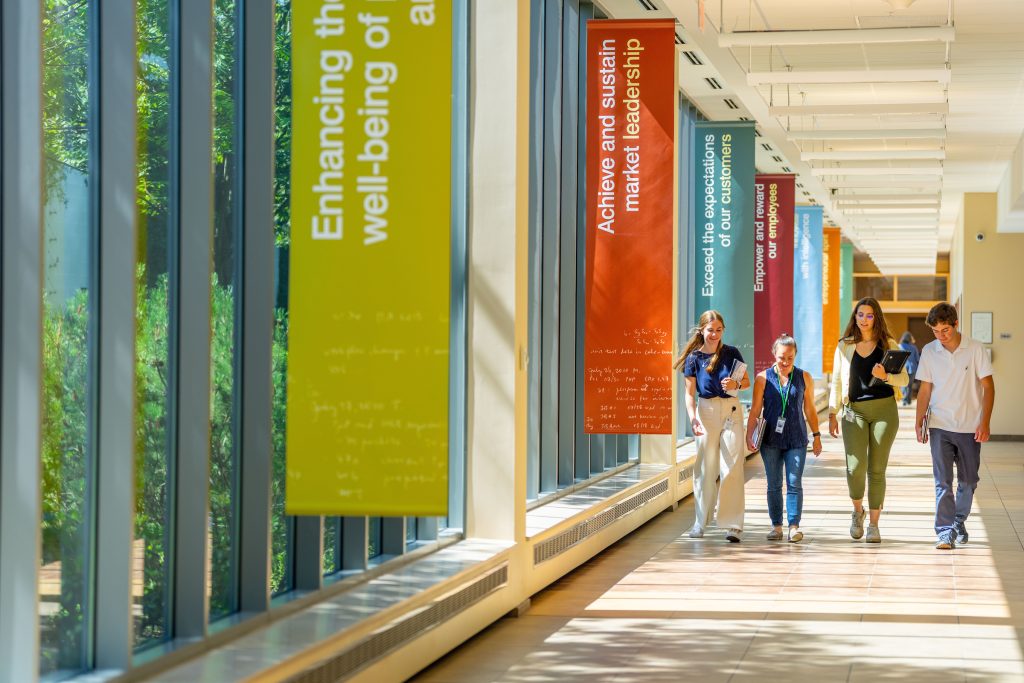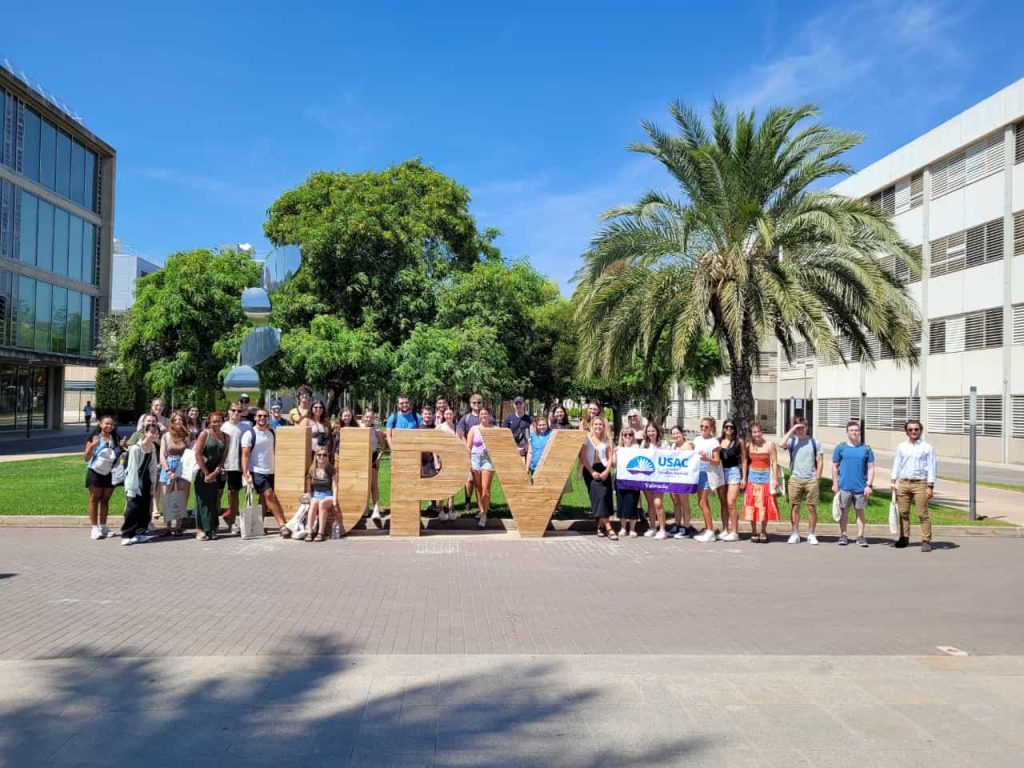Discover Your Future at the Maine College of Engineering and Computing at the University of Maine! Our graduates are changing the world all of the time! Engineering and computing graduates create innovative and practical solutions to some of the world’s biggest challenges and they work with other smart, inspiring people to invent, design and build things that matter and make a difference!
Maine College of Engineering and Computing (MCEC) offers an exceptional academic environment deeply rooted in research and innovation. With cutting-edge research focus areas such as Advanced Materials for Offshore and Infrastructure, Ocean and Marine Engineering, Biorefining for Fuels, and Biomedical Engineering, MCEC provides students with the opportunity to engage in groundbreaking work that addresses real-world challenges. The college is also at the forefront of emerging fields like Artificial Intelligence, Human-centered Computing, and Big Data, making it an ideal place for students interested in the future of technology and its applications.
MCEC’s commitment to teaching excellence is evident through its faculty, who bring diverse expertise and global perspectives to the classroom. With a low student-to-faculty ratio, students benefit from personalized attention and mentorship, fostering a collaborative learning environment. Many faculty members are not only passionate educators but also active researchers, often recognized with prestigious awards.
Beyond academics, MCEC offers a vibrant campus life that promotes inclusivity and community. Students have access to a variety of clubs and organizations, allowing them to explore their interests and develop leadership skills. The college’s support resources provide comprehensive assistance for academic, financial, and mental well-being, ensuring that students thrive in all aspects of their lives. With an increasing number of international students, MCEC is a diverse and dynamic community that prepares students for global careers.
Choosing to study at the Maine College of Engineering and Computing means being part of a forward-thinking institution that values innovation, teaching excellence, and student success in a supportive and inclusive environment.
What is Engineering and Computing?
Engineering and computer science is the application of science, mathematics, and technology to solve real-world problems by designing, building, and maintaining structures, machines, devices, systems, and processes. It involves creativity, critical thinking, and innovation to develop solutions that improve lives, enhance safety, and advance society. Computer science is an integral part of modern engineering, focusing on the development and application of software, algorithms, and data processing techniques. Together, engineering and computer science enable the creation of sophisticated systems and technologies that drive progress in fields such as robotics, artificial intelligence, and telecommunications.
MCEC Advantage
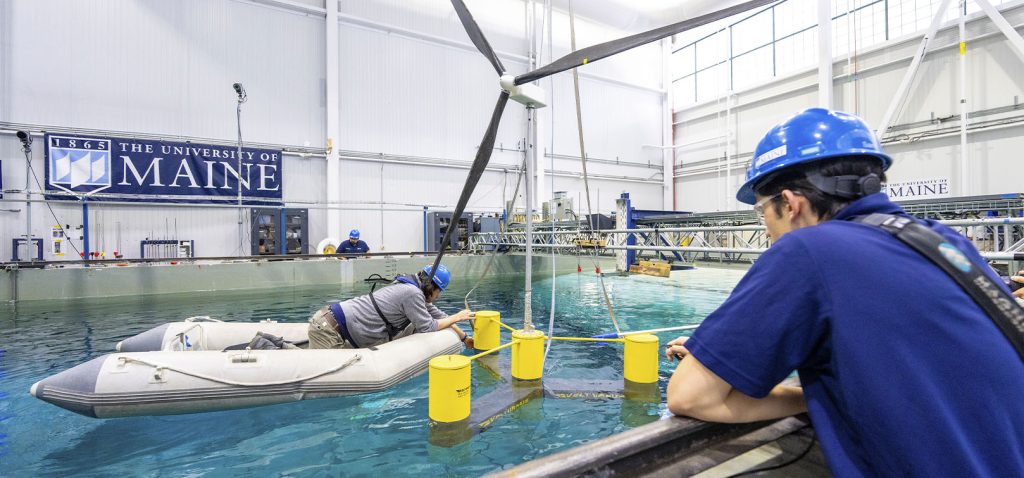
Engineering Programs
MCEC’s engineering programs are renowned for their commitment to research, innovation, and hands-on learning. With a focus on real-world applications, students engage in cutting-edge research that drives technological advancements. UMaine provides an immersive educational experience, preparing graduates to be leaders in the engineering field, equipped with the skills to solve complex challenges and contribute to industry innovations.
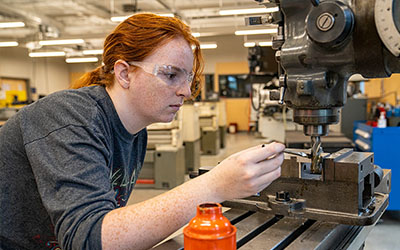
Engineering Technology Programs
Engineering technology programs offer a hands-on, application-focused education, bridging the gap between theoretical engineering and practical implementation. These programs equip students with the technical skills and knowledge needed to design, develop, and improve systems, processes, and products. Graduates are prepared for careers in industries like manufacturing, construction, automation, and electronics, where they apply engineering principles to solve real-world problems, often working closely with engineers, technicians, and other professionals to innovate and optimize technology.
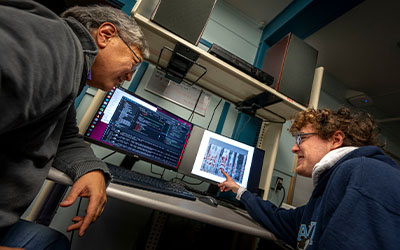
Computer and Infromation Sciences Programs
Computing education is vital in today’s digital world, equipping students with the skills to navigate, create, and innovate using technology. It fosters critical thinking, problem-solving, and creativity, empowering learners to contribute to various fields like science, engineering, and the arts. By understanding the principles of computing, students are better prepared for the future, where technology plays an increasingly central role in both personal and professional life.
Minors
Broaden your engineering education with another innovative field of engineering outside of your major. You will learn about the applications and systems in areas that will greatly enhance your skill set and college education. Meet students in other majors who may someday serve to be strategic business contacts and discover the world beyond where opportunities and adventure await to be explored.
- Biomedical Engineering
- Engineering Applications of Artificial Intelligence
- Computer Engineering
- Construction Engineering Technology
- Electrical Engineering
- Electrical Engineering Technology
- Engineering Entrepreneurial
- Engineering Leadership and Management
- Environmental Engineering
- Innovation Engineering (university wide)
- Mechanical Engineering
- Nanotechnology
- Ocean and Marine Engineering (new)
- Power Engineering
- Process Engineering
- Renewable Energy Engineering
- Renewable Energy Science & Technology
- Robotics
- Survey Engineering Technology
Minors are open to students who have completed; mathematics through differential equations; a year of physics and at least one course in Chemistry along with the prerequisites required for the individual engineering courses.
College-wide minors are open to all engineering students; however, students cannot receive a minor offered by their major department. The source for this information is the Undergraduate Catalog, where you can find further information for each minor.

Prior to enrolling in a minor a student must consult with the appropriate department chairperson to select the courses most appropriate to his/her background and career goals.
- G. Peter van Walsum – Chemical and Biomedical Engineering, Peter.vanWalsum@Maine.edu, 581-2277
- Shaleen Jain – Civil and Environmental Engineering, shaleen.jain@maine.edu, 581-2420
- Yifeng Zhu – Electrical and Computer Engineering, yifeng.zhu@maine.edu, 581-2224
- John Thompson – Physics & Astronomy/Engineering Physics, thompsonj@maine.edu, 581-1030
- Masoud Rais-Rohani – Mechanical Engineering, masoud.raisrohani@maine.edu, 581-2120
- Will Manion – School of Engineering Technology, wmanion@maine.edu, 581-2184
Internships & Co-ops
UMaine engineering students obtain interesting, substantial, and career-related cooperative education positions or internships, with employers within the State of Maine and beyond. In a competitive job market, a student’s career-related work experience can make the difference in obtaining a permanent position. Studies show that compared to students who have not participated in a cooperative education program, co-op students:
- do better in school
- are more likely to graduate
- are ahead in preparation for their field
- are viewed as better candidates in job interviews by employers
- receive more job offers
- earn higher starting salaries
- are more likely to get the job with the employer they want after graduation
More Programs
ONLINE Engineering Courses
Take online engineering courses from anywhere – home or office. Don’t let geography stop you from furthering your engineering education. The College of Engineering at the University of Maine offers online engineering courses from ABET accredited engineering programs.
The online courses will use Adobe Connect Pro, which allows the courses to be received on any computer with a high speed internet connection. Students can text message the instructor during class, ask questions, and if the student’s computer has a camera, the instructor will be able to see them. No software is needed for the receiving computer – it is all web based. Although this is a synchronous course and students are expected to attend during the class time, the lectures will be recorded so that students can watch them at a later time.
UMaine ONLINE is the place to check on all online course, certificate and degree programs.
Check Maine Street for more information on current online courses.
Professional Science Masters in Engineering & Business – online masters program
5-Year MBA Program
The Maine Business School revised its five-year MBA program in 2004, designed specifically for non-business students at the University of Maine. The program allows these students to complete the MBA in one academic year and two summer terms, incorporating required undergraduate prerequisites. Eligible students apply in their junior year with strict GPA and GMAT requirements and can take two graduate courses during their senior year. This program reduces the number of required graduate credits from 42 to 33 and aims to attract quality students from diverse backgrounds while fostering collaboration with other campus programs.
The following engineering departments offer the 5-Year MBA Program for their degree programs:
- Electrical and Computer Engineering
- Chemical and Biomedical Engineering
- Civil and Environmental Engineering
- Mechanical Engineering
- School of Engineering Technology
Please contact each department individually for more information on this opportunity.
Dual Degree Program
The MCEC’s dual degree program, in partnership with the College of Liberal Arts and Sciences, offers a unique opportunity for students to excel in a wide range of careers. This program combines a rigorous engineering education with a comprehensive understanding of societal issues, equipping students with the versatility needed in today’s dynamic workplace.
Students who bring a liberal arts background to their engineering and computing studies gain a deeper appreciation for the human elements inherent in every challenge, alongside their technical expertise. Professionals who have combined both fields of study often speak to the expanded opportunities and richer perspectives their education has provided. Moreover, they bring added dimensions to their careers, whether it’s a passion for the opera, fluency in foreign languages, or a broader cultural awareness—making them both knowledgeable and engaging.
Honors College
The University of Maine Honors College is especially well-suited for engineering majors who are interested in interdisciplinary courses and interaction with students outside the field of engineering. Honors course work expands the educational experience in the humanities and social sciences and also allows engineering students to explore their own majors in greater depth than is possible with a traditional schedule. The Honors curriculum satisfies all of UMaine’s general education requirements except math and science.
To graduate with Honors, students must complete a minimum of seven HON courses. The Honors Thesis is built around HON 498 and 499 taken in the senior year. Typically, Umaine engineering students build a thesis around research conducted within their home department. Some majors allow credit for an Honors Thesis in engineering to replace engineering electives or some of the capstone requirements.

Contact the Office of International Programs:
Office of International Programs
5727 Estabrooke Hall, Room 240
Orono, ME 04469-5727
Phone: (207) 581-3437 | Fax: (207) 581-2920
Email: internationaladm@maine.edu
Deadlines for application: April 1 for fall or full year; October 15 for spring.



